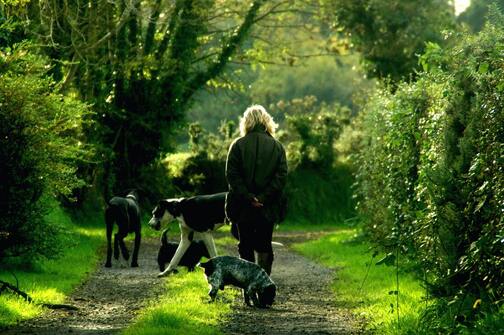|
The joy of social media is that they are always promoting the quick fix or the fastest way to solve a problem with the least amount of effort. Now don’t get me wrong, who doesn’t want to get the quickest results with the least amount of effort? I think most would put their hands up for that. However, when it comes to dog training or modifying behaviour, I want you to be very aware that most quick fixes will involve fear, anxiety and even pain.
I was watching some before and after training videos from another trainers Facebook page, of a young spaniel that pulled on its lead. The owner was struggling to hold onto him as he excitedly pulled up the road. The next video, which said was 20 minutes later, showed the young dog no longer pulling on lead, the owner looked like she was having a much nicer time BUT the body language the dog was displaying actually made me cry. He was totally submissive he had lost his bounce and joy and was looking very anxious and showed many stress signs. I don’t know what the ‘trainer’ did to this dog to get this behaviour, and yes, the results are what the owner wanted however I truly believe the price the dog paid was too high. The damage to the relationship between the dog and owner has taken a huge hit and caused severe damage. I also believe the owner really didn’t understand what damage this sort of training can do. Why would they question it – they had hired a professional? Reward based training is just as it says. You use rewards such as food, toys, praise etc to motivate the dog so that they will do the behaviour that you want from them. I am totally happy to reward my dog for them to do what I need from them. To build a relationship of trust, to spend time understanding my dog and what their needs are. This isn’t about ‘cheese pushing’ as sometimes reward based trainers are called – this is science. Proven to work for all animals. Have you considered that most behaviours we want from our dogs are for our benefit and not theirs? Come back when we call; from their point of view, we are actually ruining their chase game. Walking nicely on lead; we walk so slowly, and they want to get to the park to investigate all the new sniffs, why would they not pull all the way? Don’t bark at other dogs; what if barking makes them feel safer as the other dog goes away? Don’t raid the bin; dogs are scavengers, so why wouldn’t they eat anything they have access to? This doesn’t mean all these skills cannot be taught, and behaviours modified, but it does take time and practise so they can learn. Can you imagine if you did something that you thought was fun and perfectly natural, but you got punished for it? No explanation. Just got shouted at or jerked by a lead or other equipment that causes pain. Each time you did that behaviour you received a negative consequence when it happened. Would you learn to stop doing it? Yes, probably, over time, however, wouldn’t it be preferable to be taught with kindness? To be shown what was expected of you, and be rewarded when you did it right and the environment set up so that you couldn’t fail? Anyone can call themselves a dog trainer or behaviourist. The industry isn’t regulated. Please be careful when choosing someone to help you. If you are looking for someone, then please use the ABTC website which lists all trainers around the country. These people have to be a member of certain organisations where they have been assessed and use positive, up to date, training methods. https://abtc.org.uk/ Having a dog is a privilege, to share your lives together. Make sure your journey together is one of fun, love and understanding. Jo x
0 Comments
Leave a Reply. |
Archives
June 2024
|
|
© COPYRIGHT Paws4teaching 2023
Terms and conditions |




